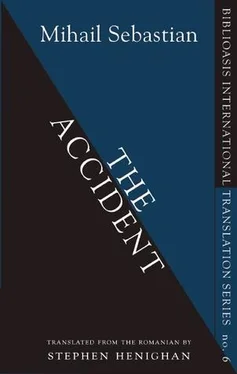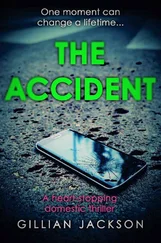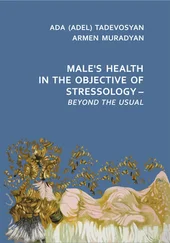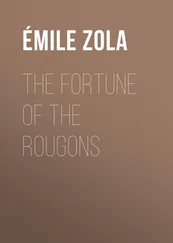Now and then he dared to close his eyes. Only for a few seconds. He felt weightless, without memory, without a past…
Sometimes Nora went first. He saw her heading away at high speed with her knees barely bent, her poles held behind her and lifted a short distance above the snow like two oars frozen for a second in midair. He would find her farther down the trail, waiting for him. They didn’t speak to each other. He would pass close to her with a salute or a look. They understood one another very well with their eyes. Both knew that there were no words for what they wished to say to each other.
They made a brief stop at the point indicated by Gunther on the map, more to check their itinerary than to rest. On their left they passed a trail marked with red rectangles that went to Poiana, while on the right, a bit farther along, a trail marked with a red cross inside a blue square ran downhill towards Timişul-de-Jos. Not one of these trails had the gentle, restful slope of their trail. It unfurled before them, white between the pine trees, with barely perceptible undulations.
“I’m afraid of falling asleep on my skis,” he told Nora before heading out again.
“Why?”
“I don’t know how to describe it. I feel myself soaring. It’s a kind of bliss.”
They reached Crucur at four o’clock. More sprawling than Ruia, the clearing looked wilder, more abandoned. It might also have been an effect of the light, which was beginning to weaken. The fir trees in Ruia had been green: a vivid green. Here their green had begun to shade towards black.
The lead-grey mist sometimes faded away with evening, which wasn’t far away.
They went into the forest ranger’s cabin to ask about the weather. The door was open, but they didn’t find anyone inside. It seemed to be more a mirage than a house. Only a few extinguished coals in the fireplace — who knew how long they’d been there? — showed that human steps had once passed this way.
“I wouldn’t want dusk to overtake us on the trail,” Nora said.
They opened the map, measuring the length of the trail that remained before them. The itinerary Gunther had established for them made long detours and went to Braşov, by way of the foot of Tâmpa Hill.
“It’s too much. We should try something else.”
From Crucur a trail blazed with yellow-and-blue signs set out downhill to the right through the woods. It wasn’t, properly speaking, a trail: more a path, likely the route to a natural spring now vanished beneath the snow.
“Are you ready for adventure, Paul?”
“Ready.”
In response, she set out ahead of him, shouting now and then to tell him that the trail was clear and that he could follow. His poor old snowplow collapsed at the point of departure. His skis skidded incessantly. There was no way to collect himself, to stop the skid. For a distance of several hundred metres the trail wound between the pine trees with tight, unexpected curves. Paul didn’t succeed in taking a single curve on his feet. At each one he was hurled into the snow, falling, rolling over. At regular intervals he heard Nora’s shout and replied to her.
“Are you coming?”
“I’m coming.”
In fact, he was coming. He couldn’t do anything else but keep coming. Sometimes he got snagged on a pine tree or a rock, but the skis carried him forward.
“It’s been hellish,” he told Nora, when he finally caught up with her. His forehead and cheeks were scratched, his breath shook with effort. “It’s been hellish,” he repeated, “but we’re moving faster.” He knew there was no room to choose or turn back. They were in the middle of the forest and, whatever the price, they had to get out of there. Dusk was nipping at their heels.
Now the trail ran straight downhill without any detours, cutting crossways through the forest. The slope was much steeper than it had been until now, but at least there were no violent changes of direction. The rustling of the skis on the snow became progressively harsher as, at sunset, an icy crust formed on the surface. They stopped at the junction of two trails where a board put up by the Touring Club, half covered in snow, pointed out to the left a path marked with yellow crosses in red squares: To Poiana .
“If you want,” Nora suggested, “we can take it to Poiana. There we can pick up the caterpillar to take us to Braşov.”
“And if it’s not there?”
“Then there’s nothing we can do.”
Paul thought for an instant, then rejected this idea. “No, Nora, we’ve started a game. I want to play it to the end. I want to enter Braşov on skis. On my skis.” He wasn’t even joking. He was grim and intent. “Shall we go?”
One could say that only there did their run truly begin. They travelled at a short distance from each other, crouched over their skis with their foreheads thrust forward, their shoulders slightly raised, as though they were on the verge of spreading their wings. Their ski boots danced on the snow in small leaps and lifted the powder, which the wind flung in their eyes. Nora continued to maintain the lead, bareheaded, with her hair tossed about around her temples. Now and then she shot a quick glance in his direction to check that he was following her. Their eyes met for a second, or even less. Paul leaned ever farther forward, bent his knees ever more deeply. There were moguls that shook him, as though they were going to fling him over backwards. He received the impact in his chest and crouched lower over his skis.
He didn’t know how long they had been following this trail nor how much more lay ahead of them. He had fallen a number of times, but each time he got up immediately and set off again, feeling that if he delayed he would no longer have the courage to get up. The light of the cloudy dusk dwindled without a glimmer. The fir trees were wrapped in their evening mist, as though in smoke.
Up ahead, Nora shouted something. It sounded like a cry for help, but he didn’t hear it clearly: it seemed to reach him from a great distance.
Paul hurled himself to the right and slid through the snow for a few seconds. He hit his elbow and knees, but somehow managed to bring himself to a halt. He got up, dizzy, staggering on his skis. “What happened?”
Nora pointed between the pine bows in the direction of nearby lights. “We’ve arrived. We’re at the edge of Braşov.”
On the streets of the town they stopped in front of shop windows, they ran into pedestrians, they watched buses, cars and sleds passing in front of them, they read cinema billboards, they listened to the shouts of newsboys selling the evening newspapers — and yet they didn’t come to their senses, ambling along confused and deaf. The silence of the woods lingered in him like the extended note of an organ.
He went in to buy their concert tickets, chose their seats, received his change, asked questions, replied — all in an absent, mechanical way.
“What’s wrong with you, Paul? Don’t you want to wake up?”
“Of course, but I can’t.”
Braşov, with its evening lights, its streets thronged with people, its glowing shop windows, its whole Christmas Eve bustle, was unreal to him.
“You know how I feel, Nora? Like a wolf that’s come down from the woods to the edge of town… And now I don’t dare go any farther.”
There wasn’t a single free spot at the Coroana. The hotel was full, while in the lobby people who had come in on the last train waited without hope, their baggage not yet unpacked. They left their skis there and went to ask at the smaller hotels and holiday villas in the vicinity.
“You’re wasting your time,” someone told them. “There’s not a bed to be had in the whole city. People are sleeping wherever they can: in restaurants, in cafés, at the train station…”
Читать дальше












